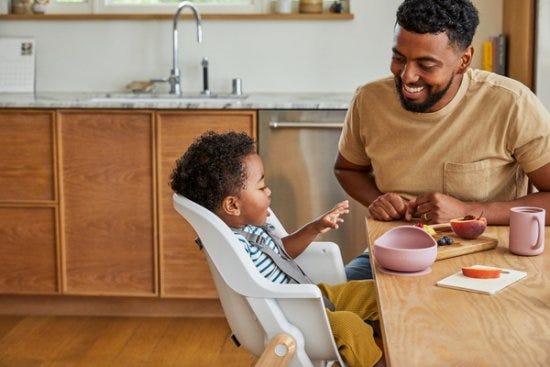Nurturing Resilience and Happiness A Guide to Children's Mental Health

In today's fast-paced and ever-changing world, children's mental health has become an increasingly popular topic of discussion. We’re navigating a whole new world with them with the effects of social media alone, not to mention all the ‘usual’ lessons and obstacles that come our children’s way. The well-being of our young ones is not only crucial for their present happiness but also paves the way for a resilient and fulfilling future. There is hope! There are so many resources and so much more knowledge about how to support our children’s mental health, and we’ll discuss some of that here in this blog.
Understanding Children's Mental Health
Before diving into the strategies and tips for promoting children's mental health, it's essential to understand the factors that contribute to their mental well-being. Mental health for kids encompasses a wide range of emotional, psychological, and social aspects that shape their overall happiness.
Today's children face unique challenges and issues that can affect their childhood mental health. Academic pressures, social media, peer relationships, and family dynamics all play a role in shaping their emotional landscape. Recognizing these challenges is the first step in addressing them effectively.
It’s also worth noting that their brains are not fully developed! This adds such a complex layer to supporting them as we really are helping lay the building blocks for their future, but we may not see all the benefits of our work until much later!
 The Role of Resilience in Mental Health
The Role of Resilience in Mental Health
Resilience, often described as the ability to bounce back from adversity, plays a significant role in children's mental health. Fostering resilience can help children navigate life's ups and downs with confidence and strength. It is a crucial skill that can positively impact their mental well-being.
Creating Good Habits
One way to nurture happiness in children is by helping them create good habits. Teaching them the importance of routines, such as spending time outside from an early age, eating meals together as a family, and engaging in creative pursuits, can significantly contribute to their emotional well-being.
Spending Time Outdoors
Spending time outdoors is not only enjoyable but also essential for a child's mental health. Even babies in carriers can benefit from the fresh air and natural surroundings. Outdoor activities stimulate their senses, promote physical activity, and encourage a sense of wonder about the world around them.
BROWSE BABY CARRIERS
Eating Meals Together
 Sharing meals as a family fosters a sense of connection and emotional well-being.
High chairs are a great tool for creating a comfortable and engaging environment for young children during mealtime. It's a time for bonding, conversation, and teaching healthy eating habits.
SHOP ERGOBABY EVOLVE HIGH CHAIR
Sharing meals as a family fosters a sense of connection and emotional well-being.
High chairs are a great tool for creating a comfortable and engaging environment for young children during mealtime. It's a time for bonding, conversation, and teaching healthy eating habits.
SHOP ERGOBABY EVOLVE HIGH CHAIR
Creative Pursuits and Learning
 Encouraging children to explore their creativity and learn new skills is another key to their happiness.
A kitchen tower, a safe and stable platform, allows them to participate in cooking and other activities, promoting a sense of achievement and self-confidence.
SHOP KITCHEN TOWERS
Encouraging children to explore their creativity and learn new skills is another key to their happiness.
A kitchen tower, a safe and stable platform, allows them to participate in cooking and other activities, promoting a sense of achievement and self-confidence.
SHOP KITCHEN TOWERS
Finding and Nurturing Hobbies
Hobbies provide children with a sense of purpose and joy. Whether it's painting, playing a musical instrument, or participating in sports, hobbies allow kids to explore their interests and passions. Nurturing these hobbies can boost their self-esteem and overall happiness.
Social Interactions
Social interactions are vital for a child's emotional development. Encouraging friendships and teaching social skills helps children build positive relationships. Group activities and playdates offer opportunities for social growth and happiness.
Practical Tips for Supporting Children's Mental Health
Creating a supportive environment at home is paramount in promoting children's mental well-being. Parents can provide emotional support, set boundaries, and encourage open communication. Schools and educators also play a crucial role in fostering childhood mental health through educational programs and counseling services. Additionally, communities offer resources for mental health support, including local organizations and services.
The Intersection of Technology and Mental Health for Kids
In today's digital age, technology is an integral part of children's lives. While it offers many benefits, it also presents challenges to their mental health. Responsible use of technology, including setting screen time limits and monitoring online activities, is essential to ensure that technology enhances rather than hinders well-being. These rules and boundaries will vary from family to family. Find what works best for you and your children.
The Importance of Open Communication
Open communication about mental health is crucial for children's well-being. Parents and caregivers should create a safe space where children can express their feelings and concerns without fear of judgment. By breaking down stigmas and promoting understanding, we can help children develop a healthy relationship with their emotions.
Resources for Parents and Caregivers
I think it’s worth noting that I, of course, am not a mental health professional. I am a mother of two young girls just trying to do my best. Through a LOT of research, time, and trial and error, these suggestions are meant to be just that: suggestions. If you are concerned for your child’s mental health, find a therapist that you can work with or talk to your primary care provider.
Dr. Becky, from Good Inside, is an incredible resource. For $84 you get a three-month membership to her program where you have unlimited access to her parenting resources. My daughters are BOTH very deeply feeling kids and her resources have been invaluable to us.
Books:
This book offers insights into understanding your child's brain development and provides practical strategies for nurturing emotional intelligence.
A classic book on effective communication with children, offering techniques to build better relationships.
Explores the connection between a parent's own emotional experiences and their child's development, providing a deeper understanding of parenting.
Offers guidance on discipline that focuses on empathy and understanding your child's needs.
Podcasts:
This podcast provides practical advice on various parenting topics, including children's mental health and positive discipline.
Carol Tuttle explores different personality types in children and how to parent them effectively.
A podcast that covers a wide range of parenting topics, often delving into the emotional aspects of parenting.
Offers insights into mindful and respectful parenting techniques, including handling challenging behaviors.
Focuses on simplifying family life and creating a calm and nurturing environment for children.
Blogs:
Dr. Markham's blog offers a wealth of articles on positive parenting, emotional intelligence, and children's mental health.
Provides practical strategies and tips for positive discipline and effective parenting.
A blog that delves into children's emotional and mental well-being, offering insights and advice for parents.
This blog covers a wide range of topics related to children's mental health and well-being, with contributions from experts in the field.
May your takeaway from this article be this: your child’s mental health is of utmost importance! Nurturing resilience and happiness in our kids is not only about addressing challenges but also about creating a foundation for a resilient and happy future. As parents, we can empower our children to navigate life's challenges with confidence and lead fulfilling lives. And you are not alone! Parenting is hard work and beautiful work. Find your people that will support you along the way.

 The Role of Resilience in Mental Health
The Role of Resilience in Mental Health  Sharing meals as a family fosters a sense of connection and emotional well-being.
High chairs are a great tool for creating a comfortable and engaging environment for young children during mealtime. It's a time for bonding, conversation, and teaching healthy eating habits.
SHOP ERGOBABY EVOLVE HIGH CHAIR
Sharing meals as a family fosters a sense of connection and emotional well-being.
High chairs are a great tool for creating a comfortable and engaging environment for young children during mealtime. It's a time for bonding, conversation, and teaching healthy eating habits.
SHOP ERGOBABY EVOLVE HIGH CHAIR
 Encouraging children to explore their creativity and learn new skills is another key to their happiness.
A kitchen tower, a safe and stable platform, allows them to participate in cooking and other activities, promoting a sense of achievement and self-confidence.
SHOP KITCHEN TOWERS
Encouraging children to explore their creativity and learn new skills is another key to their happiness.
A kitchen tower, a safe and stable platform, allows them to participate in cooking and other activities, promoting a sense of achievement and self-confidence.
SHOP KITCHEN TOWERS























